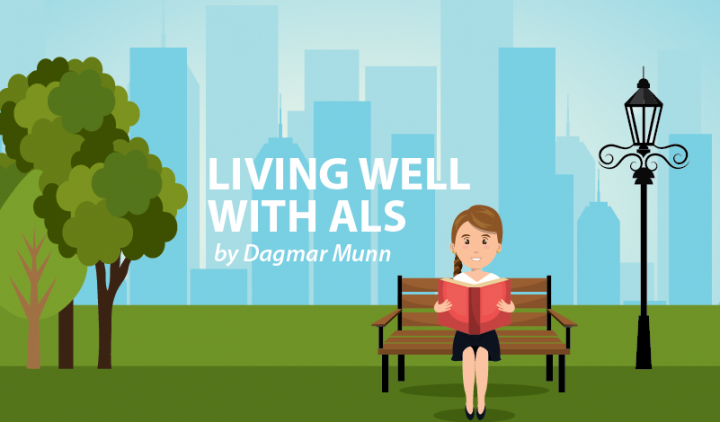5 Things That Keep Me Motivated

Living with ALS presents many challenges, and staying mentally motivated is right at the top of the list. Being proactive to prevent our emotions from spiraling downward is easier than picking ourselves up after we’ve hit rock bottom. So, I want to share the five things I do to keep myself motivated:
1. Recite positive affirmations
Affirmations are encouraging statements we tell ourselves to maintain a positive mindset and keep our worries in perspective. The goal is to counteract any negative self-talk that arises during the day.
I practice affirmations as soon as I wake up in the morning. Studies show that optimism boosts heart health, improves sleep quality, and has benefits for mental well-being.
So, what do I say to myself? I mentally chant: “I am happy, I am healthy, I am fit, and I am successful.”
When I hear these words ringing in my head first thing in the morning, I feel them.
2. Get moving
You call it exercise, but I call it therapeutic movement. Before I get out of bed, I gently roll my head to the right and then to the left. I shrug both shoulders, then reach my arms up, out, and across. Breathing deeply, I pull my knees to my chest and slowly roll my body right and left. And so on. I’m waking up my nervous system, vestibular balance system, muscles, joints, lungs, and more.
With the safety of my mattress beneath me, I move, roll, reach, and stretch, allowing my body and brain to connect. I make friends with my muscles and how they’ll move today.
When I first began this morning ritual, it was only five minutes long. But as I’ve grown more adept and increased repetitions, it’s expanded to 25 minutes. The result is that I feel refreshed all morning. If my day becomes so jumbled that I miss one of my exercise sessions, I remind myself that at least I did my morning moving routine.
Need ideas on how to move? Since my ALS diagnosis in 2010, I’ve practiced the fundamental movements taught by Original Strength. These resets can be performed on the floor, on a mattress, or in a chair. Another option is this simple warmup, which is adaptable for sitting, standing, or lying down.
3. Choose bright colors
Colors make a difference. The advertising, interior design, and clothing industries all use color to influence our emotions. Bright colors invoke feelings of energy and action and catch our attention. Dark colors feel somber and induce feelings of melancholy.
I choose brightly colored clothes to wear when I need an extra oomph of motivation.
Jules Standish, author of “How Not to Wear Black,“ notes that certain colors trigger neurological responses in the brain. “Looking at warm, bright colors such as red or pink release the ‘feel-good hormone’ dopamine — this can improve mood and heighten attention span,” she writes.
Wearing bright colors can have far-reaching benefits, promoting positive feelings in the person wearing the colors and in anyone who looks at them.
4. Engage in intelligent conversation
Just as we know that it’s important to exercise our muscles and move our joints, it’s equally important to exercise our brains. A day spent answering “yes” or “no” or being a sponge to television news doesn’t keep our minds healthy.
I try to engage in at least one in-depth conversation every day that lets me share my opinions, thoughts, and creative ideas on a topic. I know I speak slowly and have trouble pronouncing some words, but that doesn’t stop me. I’m not embarrassed. I’ve found that when I make an effort to speak, others make an effort to understand me. My self-esteem benefits and I feel valued.
When I eventually need to depend on a synthesized voice to talk for me, I expect to remain an active participant in conversations.
What about when there’s no opportunity or time for in-depth dialogue? As I wrote in a previous column, learning new skills and pondering different ideas help to develop our powers of reasoning. To help stimulate my thoughts, I use online resources such as TED Talks and the websites Brain Pickings and Curiosity.
5. End the day with gratitude
I fall asleep while remembering the day’s events and people with thoughts of gratitude. This habit causes me to look for the positives throughout the day. Paying attention to the good things that happened helps to reduce the negative thoughts.
Give my suggestions a try.
Seize the day and learn how to live well while living with ALS.
***
Note: ALS News Today is strictly a news and information website about the disease. It does not provide medical advice, diagnosis, or treatment. This content is not intended to be a substitute for professional medical advice, diagnosis, or treatment. Always seek the advice of your physician or other qualified health provider with any questions you may have regarding a medical condition. Never disregard professional medical advice or delay in seeking it because of something you have read on this website. The opinions expressed in this column are not those of ALS News Today or its parent company, Bionews Services, and are intended to spark discussion about issues pertaining to ALS.








Julie VM
Wonderful inspiration once again. Thank you Dagmar!
Sergiy
I also say motivating affirmations to myself, do physical exercises: it really works! I believe that positive thinking attracts positive reality: the materiality of thought ...
Mauro Maesa
"Mentalità positiva"? Senz'altro, ma se la Scienza non riesce a tirare fuori un ragno dal buco, nonostante tutti gli sforzi, con la mentalità positiva "ci fai la birra", come si dice dalle mie parti! Servono PRINCIPI ATTIVI EFFICACI! Certo, non è facile!
Eileen
Words of wisdom from a pro - thank you with mega hugs!
Diana Belland
I love the suggestions in this column, especially No.4. I am a retired university professor whose days used to be filled with opportunities for in-depth conversations. But ALS has put some limitations on the frequency of my social interactions so I frequently turn to podcasts to learn something new (and get my mind off my health!) I am a fan of TED Talks and Brain Pickings, but Curiosity was new to me. I was glad to learn about it.
Two of my favorite podcasts are Science Friday https://www.sciencefriday.com/ and The Why Factor https://www.bbc.co.uk/programmes/p00xtky9/episodes/downloads. I love to listen while I am doing my morning OS exercises and while exercising on the treadmill or recumbent stationary bike.
Dagmar Munn
Thank you Diana, for sharing these great resources with us! I will have to check these out :)